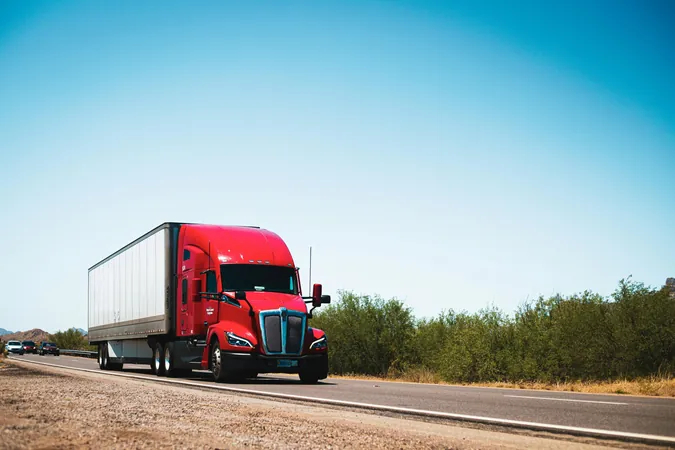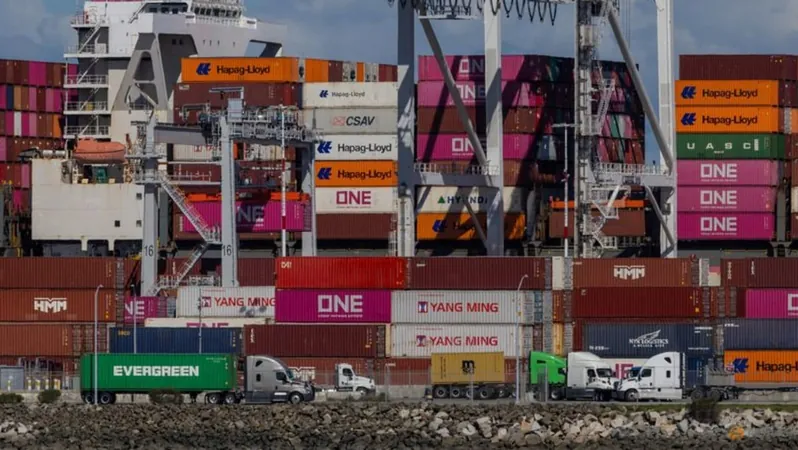
The Hidden Health Hazards Haunting Long-Haul Truck Drivers
2025-03-27
Author: Sarah
Introduction
Long-haul truck drivers are the backbone of the U.S. economy, transporting a staggering 70% of our consumer and industrial goods across the nation's highways and logging an impressive 200 billion miles annually. However, behind the wheel of these colossal vehicles lies a deeply concerning reality—an array of terrifying health risks.
Working Conditions
Despite their pivotal role in keeping America moving, these drivers are often subjected to grueling working conditions. Long hours and irregular schedules plague their routine, and navigating roadblocks like construction, heavy traffic, and unpredictable weather adds to the stress. Finding safe parking becomes an incessant quest, often leading to compromised sleep and immense fatigue.
Psychological Toll
The psychological toll is undeniable. Many truckers experience symptoms of loneliness and isolation, as they frequently find themselves away from home for extended periods. The relentless pressure to maximize miles and earnings in a rapidly consolidating industry exacerbates their already strenuous lifestyle.
Syndemics and Health Risks
Merrill Singer, a prominent medical anthropologist at the University of Connecticut, has scrutinized the disturbing health implications faced by these drivers. His research dives into the phenomenon of syndemics—where multiple diseases interact and are worsened by adverse social conditions. "The political economy of truck driving increases stress and makes life even harder for these drivers," Singer explains.
In his groundbreaking analysis published in the Journal of Transport & Health, Singer delves into the pressing health issues endemic to this profession. Many drivers endure chronic sleep disorders, with disrupted patterns linked to conditions like obstructive sleep apnea. This lack of restorative sleep is directly associated with increased fatigue and impaired driving abilities, raising a red flag for road safety.
Unhealthy Behavior
The troubling findings don’t stop there. Truck drivers are more likely to engage in unhealthy behaviors such as smoking, excessive alcohol consumption, and substance misuse, while grappling with crippling mental health disorders stemming from chronic stress. Their dietary options are typically confined to quick stops at fast-food chains or eating behind the wheel, perpetuating a cycle of poor nutrition. Roughly 80% of drivers report serious health issues, including obesity, hypertension, diabetes, and cardiovascular problems.
Access to Healthcare
Access to healthcare is further complicated by their demanding schedules, as drivers often lack the time to address these health issues properly. The consequences of neglecting health can be dire—higher rates of family disruptions, a troublesome turnover rate among drivers, and even increased incidences of suicide and fatal accidents on the roads.
Impact of COVID-19
The COVID-19 pandemic magnified these existing vulnerabilities, pushing truck drivers into heightened risk categories with one of the highest excess mortality rates during the outbreak. Singer advocates for comprehensive interventions that tackle the deep-rooted sociopolitical structures affecting drivers’ health, calling for public policy reforms that can facilitate better working conditions, improved medical care access, and nutrition support.
Conclusion
As public health officials gear up to scrutinize new emergent threats like the potential for bird flu to infect humans, it’s essential they take into account the syndemic situations of populations such as long-haul truck drivers. Protecting these essential workers is not just a matter of industry relevance—it’s a public health imperative that could disrupt yet another potential crisis.
Long-haul truck drivers may be the unseen heroes of our economy, but without systemic changes to address their daunting health risks, the cost could be significantly higher than anyone realizes. It’s time to give these workers the attention and respect they deserve—before it’s too late!




 Brasil (PT)
Brasil (PT)
 Canada (EN)
Canada (EN)
 Chile (ES)
Chile (ES)
 Česko (CS)
Česko (CS)
 대한민국 (KO)
대한민국 (KO)
 España (ES)
España (ES)
 France (FR)
France (FR)
 Hong Kong (EN)
Hong Kong (EN)
 Italia (IT)
Italia (IT)
 日本 (JA)
日本 (JA)
 Magyarország (HU)
Magyarország (HU)
 Norge (NO)
Norge (NO)
 Polska (PL)
Polska (PL)
 Schweiz (DE)
Schweiz (DE)
 Singapore (EN)
Singapore (EN)
 Sverige (SV)
Sverige (SV)
 Suomi (FI)
Suomi (FI)
 Türkiye (TR)
Türkiye (TR)
 الإمارات العربية المتحدة (AR)
الإمارات العربية المتحدة (AR)